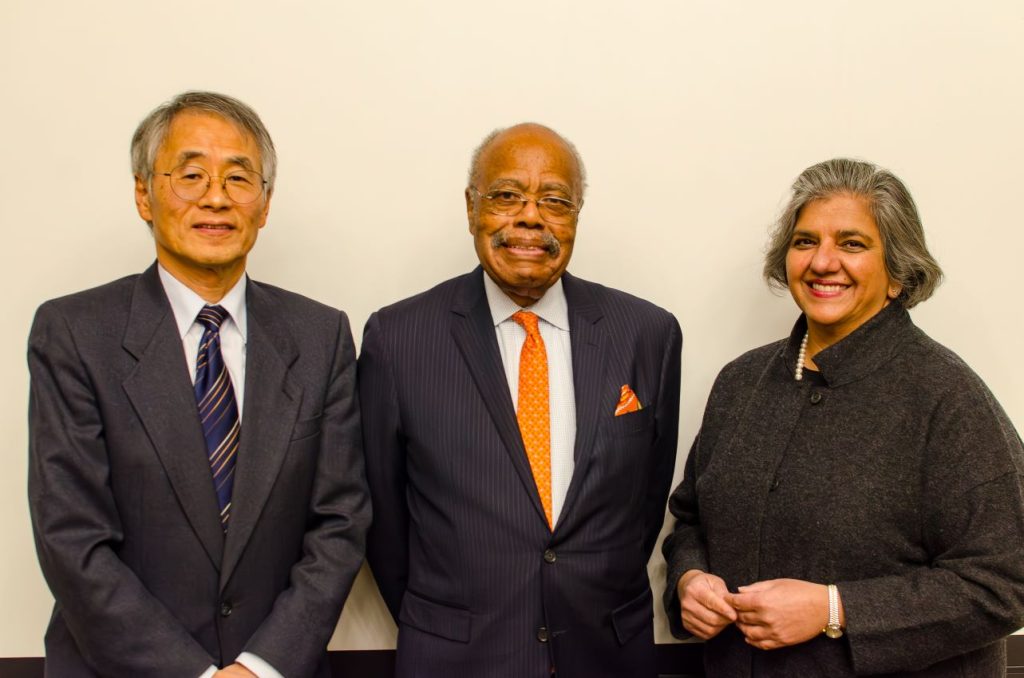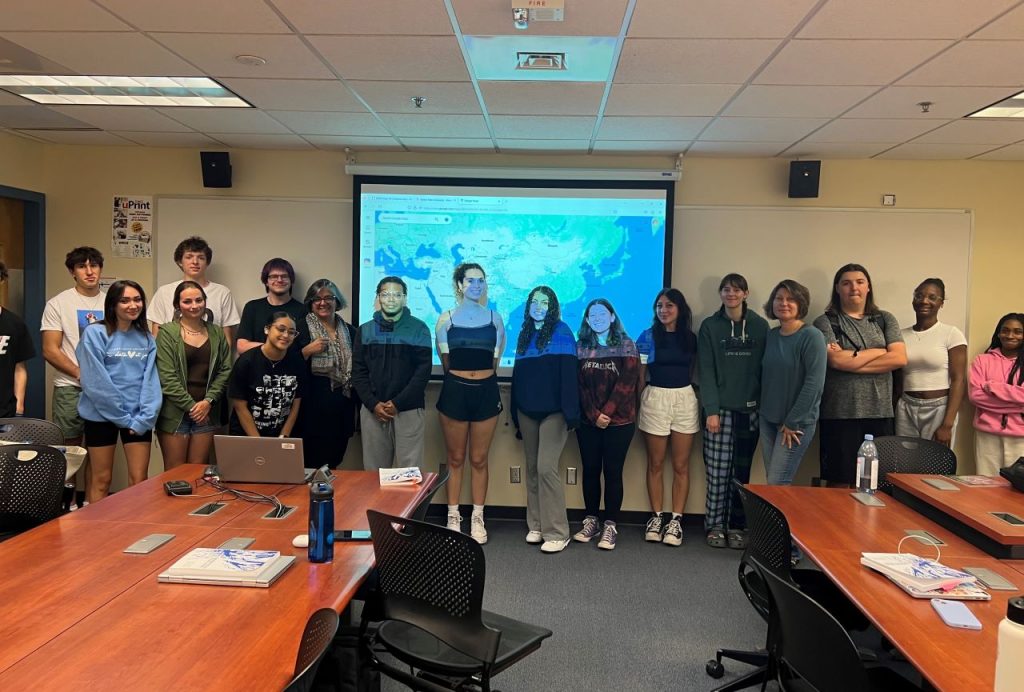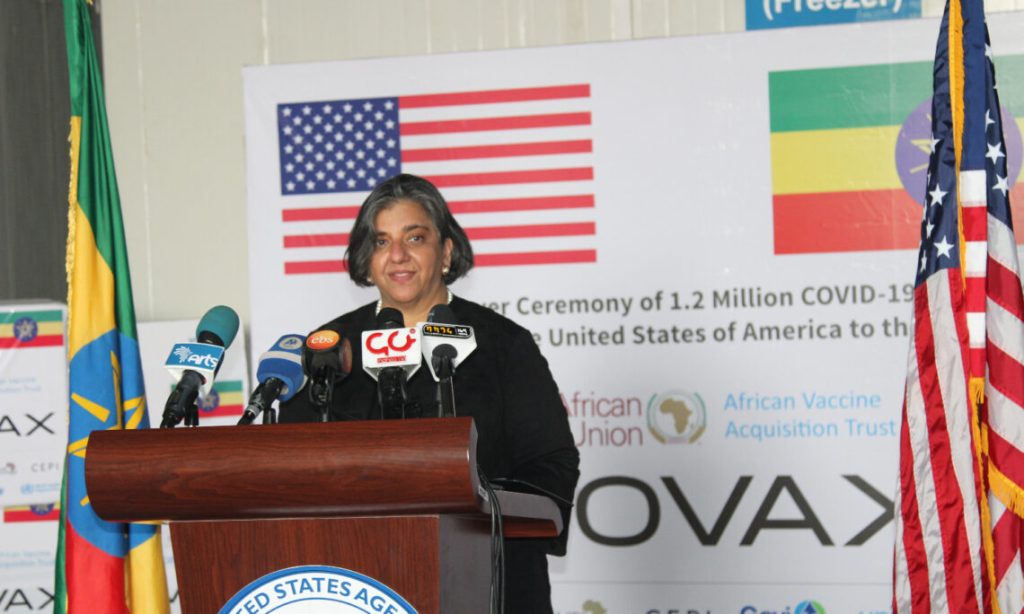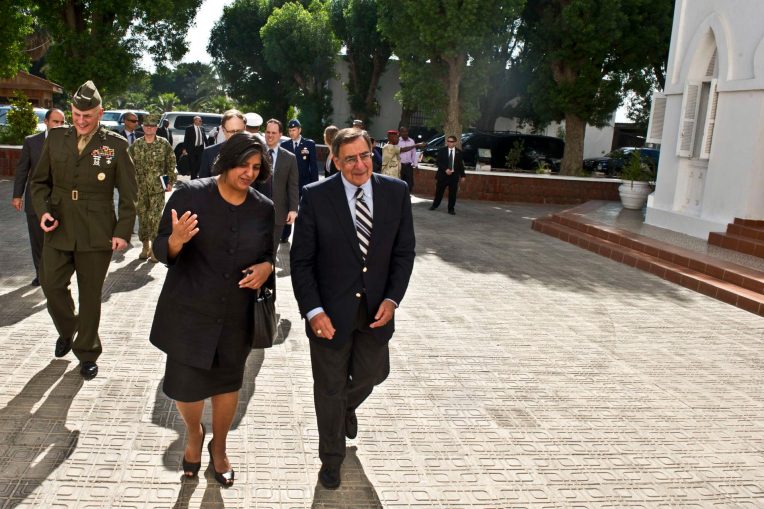Geeta Pasi thought she would be a doctor just like her father, but she took a different path, one that allowed her to serve her country in posts around the world as a career diplomat in the United States Foreign Service. The retired U.S. ambassador is the inaugural Donald F. McHenry Visiting Professor in Diplomacy and International Affairs at Illinois State University.
The professorship was established by Distinguished Alum Donald McHenry ’57, who served as Ambassador and United States Permanent Representative to the United Nations. He was a member of President Jimmy Carter’s cabinet from September 1979 to January 1981.
Pasi’s public service began in 1988 and continued until 2022 when she retired after serving as U.S. Ambassador to Ethiopia. Prior assignments include serving as U.S. Ambassador to Chad from 2016-2018 and as U.S. Ambassador to Djibouti from 2011-2014. She also served overseas in Cameroon, Romania, Germany, Bangladesh, Ghana, and India. In addition, she served in Washington, D.C., at the State Department.
Her roles have focused on human rights, democracy, humanitarian assistance, and as an advocate for U.S. business.
“When I was serving, I would say: ‘Oh, the next one,’” when asked about her favorite postings. “They were all very, very different. All of these places marked me in some way and had an effect on me.”
Illinois State students now have the benefit of Pasi’s experience and wisdom in the classroom as she is in the midst of a two-year visiting professorship here.

“It’s an immense honor to be the first to serve as the McHenry Visiting Professor in Diplomacy and International Affairs,” Pasi said. “It’s fun and a lot like being an ambassador. You are leading the class, and students are like foreign service officers wanting to learn.”
In her class, each student followed a different sub-Saharan African country for the semester, learning about it in depth and following its news.
“I try to make them think critically and put themselves in the shoes of other world leaders or the people who live there. I want them to see the common humanity between all of us,” she said.
One of Pasi’s goals is for her students to understand that while foreign affairs can be complicated due to the difficulty of engaging with other countries and conflicting interests, they should still consider a career in public service.
“I want them to have an understanding of what your government does for you and inspire an interest in them in some sort of service, which doesn’t have to be for the State Department,” she said. “I do think I achieved in teaching them what diplomacy is, and that it’s been a very rewarding career in service for me.”

This semester, she said, her topic will be a broader one: National security and how U.S. embassies operate.
“For example, there is something called the dissent channel at the State Department that you can use if you disagree with a policy,” Pasi said. “Sometimes it’s just bad policy, and how do you put lipstick on a pig? We will be looking at aspects of embassy work and even run a mock embassy in class.”
Pasi said that it is essential that the Foreign Service reflect America. The State Department appreciates the value of diversity—including ethnic, educational, and geographic diversity, and is actively recruiting around the country. She wants her students to think beyond their familiar Midwestern surroundings.
“Some of my students have limited international experience, so this is a great opportunity to teach them about international affairs, and perhaps expand their thinking to include considering jobs in the international arena.”
Geeta Pasi
“Some of my students have limited international experience, so this is a great opportunity to teach them about international affairs, and perhaps expand their thinking to include considering jobs in the international arena,” she said.
Pasi is from a small town herself, having grown up in the village of Herkimer, New York, between Albany and Syracuse, not far from Cooperstown. New York City is more than four hours away by car. Her late parents immigrated from India when it was still part of the British Empire. Pasi was born in Scotland during her father’s post-graduate medical training. She’s the second of four children.
“Herkimer County had more cows than people, and I had a very American upbringing,” she said. “My parents wanted a safe place for their children to grow up, and the opportunity came up in New York state. I was a drum majorette and played the French horn; my sister was a cheerleader.”
She started out with a career in medicine in mind, but it wasn’t a good fit. She had always been interested in international affairs and foreign languages.
“I was planning to be doctor like many children of immigrants, and I pursued it, but it was not for me,” Pasi said. “So, I studied international economics and politics and began my MBA at NYU in business and French studies. I applied for the foreign service, but the application includes an in-depth background check, so I worked in New York City for two years while I waited.”
One of her most daunting tasks came near the beginning of her career. She had just started as the State Department’s sole Afghanistan desk officer in August 2001, just before 9/11.
“I was the only sole desk officer assigned to work on Afghanistan on 9/11,” she said. “I was all alone, but others came eventually. It was an honor to serve in that position, but it was quite challenging.”

Before a new posting, Pasi would immerse herself in research about the country that was about to be her temporary home. Coming to Illinois State was similar because she knew very little about the Midwest. She spent a year in Minneapolis as a child. She only recently visited Chicago for the first time.
“When I came to Illinois, I also did some research: Charlie Berens is a comedian and a journalist, and he wrote a book called The Midwest Survival Guide: How We Talk, Love, Work, Drink, and Eat … Everything with Ranch,” she said. “I read it, and it was very funny. I have to say that I can now explain the difference between a hot dish and a casserole and appreciate the fact that drivers here are very polite.”
Pasi remains passionate about the field of diplomacy and the mission of foreign service officers.
“The basic role is to advocate for U.S. views and policies to foreign governments and people and to report back what’s happening and what might be relevant,” she said. “You have to be the eyes and ears of the U.S. government and develop trust and confidence, talk to people, ask them what’s going on.
“You can’t use digital platforms to replace people. The last three feet—a face-to face conversation with another person—you’re not going to get that with Zoom.”
The U.S. Department of State has more information about career options.
At the invitation of Ambassador Geeta Pasi, Ambassador Tibor Nagy will speak to students in Dr. Sherri Replogle’s POL 101 Citizens and Governance class from 4-5:15 p.m. in Old Main, at the Bone Student Center, on January 29.

